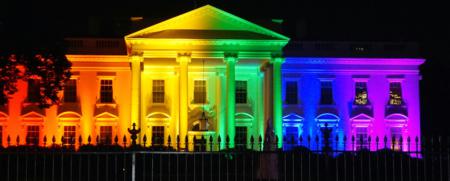With malice toward none, with charity for all
Now that the U.S. Supreme Court has decided, 5-4, that same-sex marriage is a constitutional right under our federal constitution, we might ask what the response of a believing and practicing Catholic should be to this redefinition of marriage.
Well, let's be clear about principles: In mandating the legal recognition of same-sex partnerships as marriage, the Supreme Court has chosen to constitutionalize a companionate view of marriage that is at odds with our Judeo-Christian traditional understanding of marriage as the union of man and woman. Man-woman marriage is intrinsically ordered, at least in principle, to the procreation and education of children by their mother and father. Marriage, legally speaking, is now just about adults feeling good about themselves, regardless of sex or sexual orientation. This is obviously at odds with the Book of Genesis, adopted by Jesus, which says that "Male and female God created them."
Well, we lost this legal and cultural battle over the definition of marriage, as it was lost 12 years ago here in Massachusetts, 4-3, in the Goodridge decision. In the wake of that loss, I think it important that we not be "sore losers." Part of this is recognizing that the mandated legal recognition of same-sex marriage was only possible because our collective understanding of marriage had been impoverished in many ways since the 1960s, if not before.
With the advent of contraception, for instance, marriage and even the sexual act were often disassociated from the procreation of children. With the virtual universal spread of no-fault divorce in the early 1970s, permanence and sexual fidelity became in a sense legally optional. This even without taking into account the widespread practice of both abortion and adultery, often with constitutional protection. Homosexuality did not cause this weakening of our richer, fuller understanding of marriage, but it doesn't help it, either.
And so, many people in good faith saw the legal and practical exclusion of gays and lesbians from the institution of marriage as largely just a matter of tradition, which of course can change over time. Not being a sore loser means not impugning bad motives to the winners, but rather respecting them as the persons created in God's image and likeness that they are, and not engaging in unfair discrimination against them. As to most jobs, for example, sexual orientation is irrelevant. Jesus taught us in the parable of the Good Samaritan and elsewhere that the Christian duty of charity extends to all, and that means regardless of race, creed, gender or sexual orientation.
I think one should recognize, though, that not only can our side be sore losers, but that the prevailing side can be sore winners. Being a sore winner is not being satisfied with the legal victory over the definition of marriage, but insisting on the settling of old scores and getting even with the opposition, and illiberally trying to force people conscientiously opposed to same-sex marriage to approve of it, even beyond the legal sphere.
Just as we shouldn't impute bad motives to our opponents, neither should they impute bad motives to those who had the temerity, in their view, to oppose same-sex marriage. It's easy to chalk it up to hate and prejudice, but as Ryan Anderson persuasively argues in his recently published book, "Truth Overruled: The Future of Marriage and Religious Freedom," there are serious reasons to have reservations about the judicial imposition of same-sex marriage. At a time when fewer and fewer people are getting married, and marriage and family are in a kind of crisis, the dilution of the public understanding of marriage may only accelerate the crisis.
Some people, claiming that history is in their side, are now arguing that tax-exempt status should be denied churches and other religious organizations that oppose same-sex marriage as a matter of faith. I think it's generally an open question which side history is on, and certainly until the year 2000 history was unanimously on the side of the male-female understanding of marriage. In any case, it would be highly ironic if a movement that began by calling for tolerance and understanding would end up persecuting those who see things differently.
It all reminds me of "The Hate Song" from the 1960s "The Mad Show," which was a musical based on Mad Magazine. As the group sang, "We're gonna stamp out hate, poke it in the eye, shoot it in the stomach yelling die, die, die. We'll pull its insides out, and look at what it ate, we're gonna stamp out hate." Hate is not a Christian response. Love, understanding and forgiveness are.
DWIGHT G. DUNCAN IS A PROFESSOR OF CONSTITUTIONAL LAW AT UMASS SCHOOL OF LAW DARTMOUTH.
- Dwight G. Duncan is professor at UMass School of Law Dartmouth. He holds degrees in both civil and canon law.



















